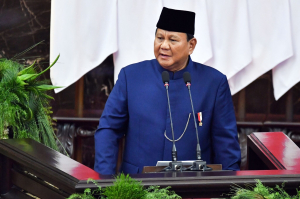J Resources Asia Pasifik sets US$ 100 million Capex for 2023
Gold producer PT J Resources Asia Pasifik Tbk (PSAB) has set US$ 100 million in Capital expenditure (Capex) for 2023, mostly for its Doup gold mining project.
Established in 2002, J Resources is an Indonesian-based mining company specializing in the exploration, extraction, processing and sales of gold and other minerals. The company's primary focus is the operation of its Batu Hijau mine on Sumbawa regency, West Nusa Tenggara. The publicly listed company majority shareholder is Jimmy Budiarto, with 92.5% ownership.
Expansion of mining production
J Resources President Director Edi Permadi said that the company was optimistic with its business opportunities in 2023, as the signs of the end of the COVID-19 pandemic were visible.
"The company's challenges and opportunities this year are mainly on completing the development of the Doup project, which has 1.8 million oz of gold reserves," he told Kontan.co.id on February 2, 2023. He added the company would allocate fund for the Doup project, a gold mining in Bolaang Mongondow regency, North Sulawesi.
In the company's public expose on December 29, 2022, the estimation of Doup capacity reached 1.6 million tons of ore per year and with an investment reaching US$ 154 million. With a reserve reaching 1.8 million oz, the company could mine nearly 60 tons of gold. Meanwhile, the amount of gold available at the mined reaches 3.4 million oz.
The 1.6 million tons of ore annual capacity will enable the company to produce about 70,000 oz of gold. The mine's lifetime could reach 20 years, Director Adi Maryono said.
"We could increase [the capacity] years after production and we'll review and increase to 3 million tons of ore per annum for production," he added.
Permadi explained that the company was also focusing on other projects, such as Bakan mine at Bolaang Mongondow. The Bakan project will start production from the new Tapagale pit this year. He hoped the operation of the new pit could reduce production costs and increase production volume.
Risks in gold mining industry
There are 3 significant challenges of Indonesian gold mining industry:
- Infrastructure constraints: In Indonesia, many areas with significant mineral deposits are located in remote and inaccessible regions. This lack of access makes it difficult for mining companies to extract and transport minerals, as there are limited road networks and ports in these regions. Additionally, the electricity grid in many areas is underdeveloped, making it difficult for companies to power their operations.
- Environmental concerns: The mining industry has been heavily criticized for its damage on the environment and local communities. Environmental degradation, such as deforestation and the destruction of wildlife habitats, is a major concern. The industry is also blamed for water pollution, soil degradation and the release of greenhouse gases.
- Labor issues: Labor disputes and low wages are common in the industry. This can lead to strikes, which can disrupt production and negatively impact the economy. Many workers in the mining industry work in hazardous conditions. Ironically, they have lack of health protection and safety regulations. This can result in serious injuries and fatalities, leading to a loss of income for workers and their families.
Already have an account? Sign In
-
Start reading
Freemium
-
Monthly Subscription
30% OFF$26.03
$37.19/MonthCancel anytime
This offer is open to all new subscribers!
Subscribe now -
Yearly Subscription
33% OFF$228.13
$340.5/YearCancel anytime
This offer is open to all new subscribers!
Subscribe now






